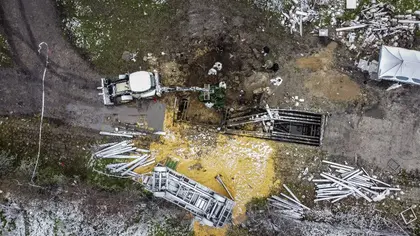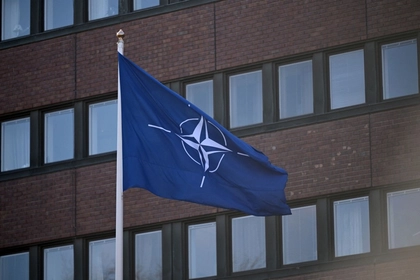The incident on Nov. 15, 2022, when a missile tragically ended the lives of two Polish nationals on a farm in the village of Przewodów, emerges as a pivotal moment of contention and solidarity. This event, far from being an isolated tragedy, has spiraled into a complex narrative involving NATO’s unity, disputed accounts of the missile’s origin, and the broader implications of Russian military activities in the region, with new perspectives emerging in the UK.
The immediate aftermath of the incident saw a swift and unified response from the Baltic states, demonstrating an unwavering readiness to support Poland, an act that underscored the solidarity within NATO. However, the narrative took an unexpected turn as both Poland and several other NATO members disputed the initial claims pointing towards Russia, instead suggesting that the missile had originated from Ukraine. The chorus of voices asserting this narrative was joined by Turkey’s President Recep Tayyip Erdogan, who, during the G20 summit in Bali – a summit that also saw the participation of Russian Foreign Minister Sergey Lavrov – repeatedly endorsed the view that the missile was not of Russian provenance.
JOIN US ON TELEGRAM
Follow our coverage of the war on the @Kyivpost_official.
Fast-forward to Feb. 22, 2024, during a parliamentary session in the UK, parliamentarian Henry Smith, a member of the Foreign Affairs Committee, raised a question that subtly revisited the shadows of the Przewodów incident. Addressing the Secretary of State for Defence, Grant Shapps, Smith inquired about the worrying trend of increased Russian air incursions into NATO airspace, linking these provocations to the tragic missile strike in Poland.

UK Leads Crimean Air Reconnaissance Operations Against Russian Air Defenses
Directing his question to the minister, Smith said “Will he comment on the increase in Russian air incursions into NATO airspace? Sadly, last year missile incursions killed two people, and missile incursions have taken place in recent weeks.”
The phrasing of his inquiry hinted at an undercurrent of belief or knowledge contradicting the previously accepted narrative – that the missile might indeed have been Russian, not Ukrainian. This suggestion stands in stark contrast to the official stance previously communicated by Polish authorities.
Adding layers to this evolving story, a September 2023 report by the Polish newspaper Rzeczpospolita introduced claims, citing sources close to the investigation, that the missile was an S-300 5V-55 air-defense missile, ostensibly fired from Ukraine. This assertion, however, was complicated by the analysis of Ryan McBeth, a US-based open-source intelligence analyst.
McBeth, through a detailed examination broadcast on his YouTube channel shortly after the incident, proposed an alternative theory. He argued against the missile being anything but Russian, suggesting instead that a cruise missile, possibly intended for a cross-border transmission power line, had overflown its target, inadvertently continuing into Poland. This analysis not only questioned the type of missile involved but also raised the alarming possibility of Russia using Polish airspace as an unintended corridor for its military operations.
The incident in Przewodów reflects a broader dilemma facing the West: how to effectively counteract Russian provocations without escalating to open conflict, all while maintaining the moral high ground and providing tangible support to Ukraine.
The dichotomy of narratives and analyses surrounding the Przewodów missile incident encapsulates the intricate web of military, political, and diplomatic considerations that define the current security landscape in Eastern Europe. As nations grapple with the challenges of maintaining security and sovereignty in the face of escalating tensions, the quest for truth and clarity becomes ever more critical.
In the evolving narrative of the missile incident in Przewodów, Poland, and the intricate dance of geopolitical maneuvers that followed, McBeth’s steadfast belief in his initial analysis adds a layer of intrigue and skepticism towards the official narratives. Speaking to Kyiv Post, McBeth underscored the improbability of a Ukrainian missile performing the alleged maneuver to land in Polish territory, suggesting instead a more plausible scenario of a Russian missile inadvertently crossing into NATO’s domain.
McBeth said: “if you look at the likely cases, it is more likely than not that a Russian missile wandered into Poland, as opposed to a Ukrainian missile doing a backflip. Things that go west to west. I don’t think it was intentional, but I believe that everyone involved just kind of let it die, because it could’ve meant war with Russia.”
This perspective challenges the narrative convenient to the political discourse, hinting at a potential suppression of facts to avoid escalating tensions with Russia.
The refusal of Ukrainian authorities to acknowledge any involvement in the incident, coupled with McBeth’s analysis and parliamentarian Henry Smith’s revealing inquiry, paints a picture of possible obfuscation by NATO members. This silence raises uncomfortable questions about the alliance’s response to direct provocations and the true cost of political pragmatism in the face of aggression.
As the European Union contemplates the seizure of frozen Russian assets following the harrowing demise of Alexei Navalny in custody, the response to the 2022 missile incident appears in retrospect as a missed opportunity for a firm stance against Russian aggression. The juxtaposition of these events highlights a pattern of reactive rather than proactive measures in the West’s dealings with Russia, perhaps influenced by the intricate calculus of international diplomacy and the fear of provoking a wider conflict.
The linkage of Western actions in the war to events within Russia, such as Navalny’s death, suggests a strategic containment effort reminiscent of how Russia localized the Chechen conflict. This approach risks reducing the Ukrainian struggle to a mere regional dispute in the public perception, thereby diluting the global resolve necessary for a decisive response. Furthermore, the timing of the asset confiscation – coinciding with the US presidential election cycle – raises questions about the motivations behind such moves and their ultimate utility in supporting Ukraine.
Arguably, Western strategy, particularly that of the United States, in supporting Ukraine has been more about replenishing old stockpiles than providing fresh, strategic aid. This approach not only questions the efficacy and sincerity of the support but also highlights a potential misallocation of resources that could have dire consequences for Ukraine. The possibility that the confiscated Russian assets, ostensibly earmarked for aiding Ukraine’s recovery, might instead be diverted to backfill Western arsenals, encapsulates a troubling scenario. Such a development would not only undermine the direct assistance needed by Ukraine but also signal a broader neglect of the moral and strategic imperatives at stake.
The interplay of military incidents, diplomatic rhetoric, and strategic decisions paints a complex picture of the international response to Russian aggression. The incident in Przewodów, and the subsequent narrative and policy maneuvers, reflect a broader dilemma facing the West: how to effectively counteract Russian provocations without escalating to open conflict, all while maintaining the moral high ground and providing tangible support to Ukraine. The choices made by NATO and its allies will be scrutinized for their implications on the future of European security and the integrity of international law – especially by Moscow.
You can also highlight the text and press Ctrl + Enter






